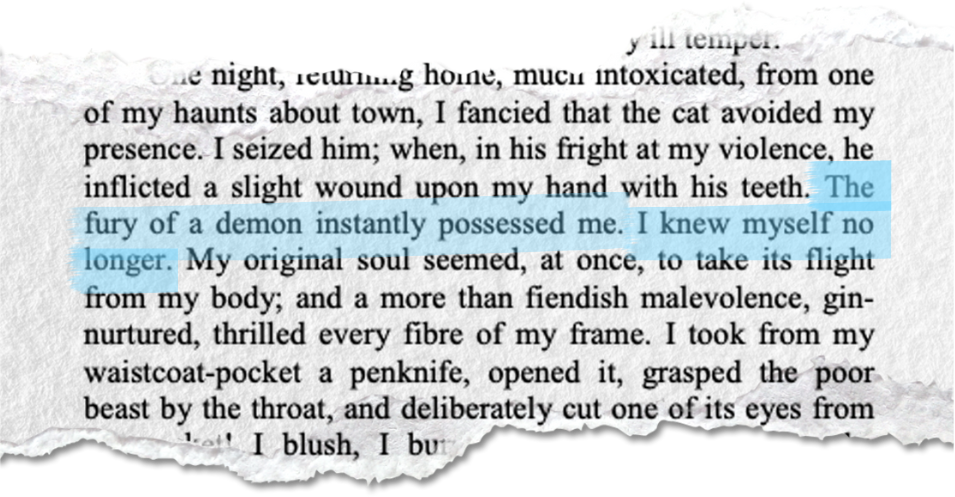The road is quiet, as if the world is holding its breath. Tendrils of mist linger in the air, veiling the path ahead in a ghostly haze. Every shadow seems to stretch and shift, twisting into phantom figures, half-formed silhouettes that dissolve as quickly as they appear. And in that stillness, the cat steps forward. A black shadow, sleek and soundless, slipping across your path like spilled ink upon parchment.
Do you shudder? Do you whisper an oath to ward off ill fortune? Or do you merely watch, entranced, as the beautiful creature vanishes into the night, its glowing eyes the last to fade?
Men have feared the dark for as long as they have huddled around fires, and within that darkness, the black cat prowls—an omen, a mystery, a trick of fate. But to know them is to unravel a tale older than kingdoms, older than the first roads carved into the earth, older than the ships that first braved the open sea.
The Goddess and the Guardian
Before the burning of witches and the clinking of shackles, there was a time when black cats were not feared. In the sun-drenched lands of Egypt, where the Nile sang to the sand and the temples stood eternal, they walked beside gods.
A cat was no mere beast to the Egyptians. It was a guardian, a hunter of the rats that threatened storages of grain. The goddess Bastet bore their form: a woman with the head of a cat. In her presence, one found both protection and ferocity, a duality that pumped through the blood of every feline. To harm a cat was a sin against the gods themselves, punishable by death (National Library of Medicine). And when a beloved cat passed, its owners shaved their eyebrows in mourning, a sign to all that a great loss had been suffered (National Geographic).
Even in distant lands, far beyond the reach of the Nile, echoes of these legendary creatures endured. In Japan, black cats were symbols of fortune, and their company in a household heralded prosperity and love. And upon the decks of ships, a black cat was a prized talisman.
The Sea and the Survivor
A ship is a cruel mistress. She carries men across the waves, lulls them into false security, and then, when the sea demands sacrifice, she drags them screaming into the deep. A sailor knows this; he sees death in the foam and prays for luck in whatever form it may take. For some, that luck came wrapped in black fur.
The British believed a ship with a black cat aboard would never sink, and in one such tale, a cat named Oscar, later known as Unsinkable Sam, proved them right. Legend has it that he rode upon the doomed Bismarck when she fell beneath the waves, only to be plucked from the wreckage and taken aboard the HMS Cossack. And when that ship met its fate, he was found again, unharmed, and carried to the HMS Ark Royal. And when the Ark Royal sank beneath the cold, merciless sea, Oscar was found clinging to a plank.
Three times, the sea had tried to claim him, and three times, he had defied her. The sailors whispered that he was either cursed or blessed, but either way, he was one of them (Royal Museums Greenwich).
The Fear and the Fire
But men are fickle beings, their hearts easily swayed, their hands quick to turn from worship to wrath. In the Middle Ages, darkness took root in the minds of men and, with it, suspicion. In its fear of evil, the Church cast its gaze upon the black cat and found something unholy in its gaze.
The decree came down in 1233: black cats were creatures of the devil, familiars to witches, and bearers of ill fortune. And so the hunt began. Fires burned high, and the streets were emptied of their kind. The world grew quieter for a time, bereft of their watchful eyes.
Yet, in killing them, men had unwittingly invited a greater scourge. The rats, unchallenged by feline hunters, multiplied, and with them came the plague. A pestilence blacker than the fur of a thousand murdered cats swept through the land, and though few dared to speak it, some wondered if they had brought this ruin upon themselves (Trasser).
Still, the superstitions lived on, their roots deep and gnarled. Edgar Allan Poe, a man well-acquainted with madness, took the black cat and twisted its legend into horror. In his tale, a man driven by guilt and drink is haunted by his feline companion, his mind unraveling as the creature becomes a harbinger of his doom (Edgar Allan Poe: Storyteller). It was a fitting fate, perhaps, for those who feared what they could not understand.

Shadows Among Shelter
The fires have long since died, and the plague has been driven back, but superstition lingers. Black cats wait in shelters, passed over time and again as if their very presence carries some dark curse.
Seventy-four percent. This is the grim fate of black cats in some shelters, their chances of euthanasia far outweighing their chances of a home. Ten percent is how many find salvation, a far cry from their brightly colored kin. It is a cruel twist of fate that these creatures of fortune should suffer such misfortune (PAWS and Jefferson).
For those who dare to look past the whispers of old crones and the tales of long-dead men, there is beauty in the darkness. Science may not deal with omens, but it knows this—those who share their lives with cats, regardless of color, find themselves happier, their hearts lighter, their sleep deeper (Newman).
A Truth Among Myths
So, the next time a black cat crosses your path, ask yourself, do you see a curse or a creature of unwavering loyalty, strength, and beauty?
I see the truth and hope to honor it in my writing. In my debut novel, The Secrets of Whispering Pines (tentative title), I will introduce a black cat named Papyrus—a character who turns stereotypes on their head. He is no omen, no shadow of misfortune. He is a companion, a guardian, a living echo of the many who have come before him, from Bastet’s temple to Unsinkable Sam’s ship, to the shelters that still wait for kindred souls to come calling.
The stories we tell shape the world we live in. Perhaps it is time to tell a new one. And if, by chance, a black cat chooses you, know that you have been given a gift.


The Legacy of Black Cats, The Legacy of Black Cats, The Legacy of Black Cats, The Legacy of Black Cats, The Legacy of Black Cats, The Legacy of Black Cats
